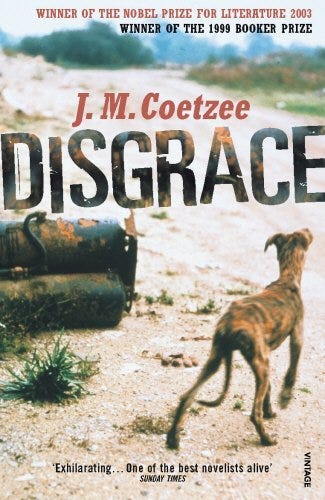This is the first novel by South African author J.M. Coetzee that I’ve read. I’ve heard about him for years, seen his novels around, was aware of his Nobel Prize winning status, but never actually got around to reading his work. It is a short but powerful novel, full of historical and literary allusions, published at a time when his home country was going through huge historic change. It is a simple, concise story, carrying a powerful message and posing some intriguing questions about not only South African history but the nature of man’s desire, historical karma, animal rights (as well as the communication between us and them, as well as between ourselves) and of course, race.
David Lurie is a divorced literature professor who teaches at a South African university. When we first encounter him, he is visiting a prostitute and there is a hint something is a little amiss about his character through his relationship with her — a little more than mere professional/client. He takes to tracking her down, wanting to spend some time with her which of course unnerves her. She’s soon out of the picture but this gives us just a hint of the professor’s attitudes toward women and his desire. One day he encounters one of his students on campus and talks her into coming home with him. He begins his game of seduction until one day he finally succeeds. He continues to pursue his desire until one day the whole thing unravels, landing him in serious trouble with the university administrators and ultimately loses his job over the affair.
Shunned by his co-workers and friends, he retreats to his daughter’s farm in the hinterlands outside of Cape Town. His daughter is in her twenties, a lesbian, living a simple life farming and taking care of abandoned animals. It’s immediately apparent their relationship is estranged, that a gulf lies between them, which is both generational and the fact he’d more or less been an absentee father. One day a horrific act of violence occurs that shocks them both to their very core, David in particular. The aftermath of this incident sets the stage for the continued unraveling of David’s life.
There is an allusion to Bryon’s late in life scandal throughout the entire novel and it mirror’s David’s own trial and travails. It is through this parallel that we begin to tease out the underlying message of the novel, something of an allegory of the history of this troubled nation — apartheid, the historical ‘payback’, the formerly privileged class losing it’s status, the limitations of language (there are numerous references to what things mean in English vs. indigenous languages).
I thought this was a great novel and there is a lot to think about here. Read this and there will undoubtably be tons of questions raised, but the answers to those questions will not be easy to find nor be able to be answered in simple ‘black and white’ terms.
Disgrace is available here.




